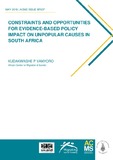| dc.contributor.author | Vanyoro, Kudakwashe P. | |
| dc.coverage.spatial | South Africa | |
| dc.date.accessioned | 2019-12-20T15:02:20Z | |
| dc.date.available | 2019-12-20T15:02:20Z | |
| dc.date.issued | 2018-05 | |
| dc.identifier.uri | https://opendocs.ids.ac.uk/opendocs/handle/20.500.12413/14927 | |
| dc.description.abstract | The South African academy has taken a principled stance against “alternative facts” or government sanctioned
, unsubstantiated falsehoods. It is committed to addressing, topics and issues that affect the well-being of the nation. Today, this commitment is far from being realised. Despite this, donor pressure for researchers to produce and supply evidence for pro-poor policy
development and for that knowledge to be translated into policy and practice, is increasing. This brief is
based on 12 months of qualitative research undertaken from February 2015 to March 2016. The study aimed
to establish the role and place of evidence on unpopular issues in policy making in a country where the maturity of the policy apparatus is low, the resilience of political
institutions is fragile and/or defensive of existing political ideologies. The study sought to explore how the uptake of evidence is mediated by contextual, institutional and issue- related particularities. | en |
| dc.description.sponsorship | DFID | |
| dc.description.sponsorship | Migrating out of Poverty | |
| dc.language.iso | en | |
| dc.publisher | ACMS | |
| dc.title | Constraints and Opportunities for Evidence-Based Policy Impact on Unpopular Causes in South Africa | |
| dc.type | Other | |
| dc.rights.holder | University of Sussex and University of the Witwatersrand | |
| dc.identifier.externaluri | http://www.migratingoutofpoverty.org/files/file.php?name=2017-18-1-acms-constraints-and-opportunities-for-ebp-in-sa-brief-final.pdf&site=354 | |
| atmire.atmiredoc.corrheight | The South African academy has taken a principled stance against “alternative facts” or government sanctioned
, unsubstantiated falsehoods. It is committed to addressing, topics and issues that affect the well-being of the nation. Today, this commitment is far from being realised. Despite this, donor pressure for researchers to produce and supply evidence for pro-poor policy
development and for that knowledge to be translated into policy and practice, is increasing. This brief is
based on 12 months of qualitative research undertaken from February 2015 to March 2016. The study aimed
to establish the role and place of evidence on unpopular issues in policy making in a country where the maturity of the policy apparatus is low, the resilience of political
institutions is fragile and/or defensive of existing political ideologies. The study sought to explore how the uptake of evidence is mediated by contextual, institutional and issue- related particularities. | en |

